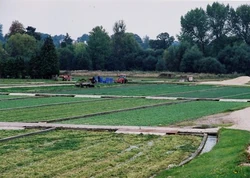
The River Itchen at Easton, near Winchester, steaming on a cold winter morning

The River Bourne at Winterbourne Gunner, a typical chalk stream

Commercial watercress production near Alresford in Hampshire
Chalk streams have characteristics which set them apart from watercourses associated with other rock types.
Chalk is porous and rain falling onto chalk hills soaks directly into the ground where the chalk acts as an aquifer. The water is filtered through the chalk, re-emerging, lower down the slope, in springs. The chalk acts as a reservoir, regulating the amount of water supplied to the springs so that its flow varies little day by day. The temperature of the water scarcely varies either, because the spring rarely deviates from 10ºC. On cold, winter mornings it can look as though steam is rising above the relatively warm river (see picture).
Chalk is soluble in rainwater because rainwater is naturally slightly acidic. Because the products of chalk weathering are disolved in rainwater, chalk streams transport little suspended material like most rivers but are instead mineral rich. The water runs clear and the river bed is covered by angular flinty gravel, derived from flints found within the chalk itself.
All these characteristics of chalk streams — consistent temperature, consistent flow, clarity of water, lack of sandy debris — contribute to their very particular ecology.
The chalk streams have been intensively managed for many generations and in the twentieth and twenty first centuries, much of that management has been aimed at producing the best conditions for fly fishing and most specifically dry fly fishing. The chalk streams hold a good number of wild brown trout and grayling as well as stocked brown trout and stocked rainbow trout. The rich insect life and clear shallow water make the rivers particularly suited to fly fishing.
Many of the chalk stream springs are also used as sites for watercress production due to the constant temperature and clean, alkaline, mineral rich, spring water.
Chalk stream is a term generally applied to all watercourses originating from chalk hills including winterbournes, streams and rivers. The term chalk stream is used even for larger rivers which would normally be too large for the term stream.
See Somme River for a hydrological view of a chalk stream on a larger scale.
Chalk Streams of the Southern England Chalk Formation in Hampshire, Wiltshire, and Dorset
- River Meon
- River Itchen and its small tributaries
- River Test and its tributories
- River Kennet which is a tributary of the River Thames
- River Piddle
- River Frome
- River Avon and its tributaries including the River Bourne
Chalk Streams of the Southern England Chalk Formation in the Chiltern Hills. (Tributories of the River Thames and River Colne)
- River Misbourne
- River Chess
- River Gade
- River Bulbourne
- River Ver
- Hambleden Brook
- Hughenden Stream
Chalk Streams of the Yorkshire Wolds
- Driffield Beck which is a tributory of the River Hull
- Settrington Beck which is a tributory of the River Derwent
Chalk Streams of the Lincolnshire Wolds
- There are several small chalk streams in the Lincolnshire Wolds including Waithe Beck
See also[]
- Chalk Formation
Source[]
- Adapted from the Wikipedia article "Chalk stream" http://en.wikipedia.org/wiki/Chalk_stream